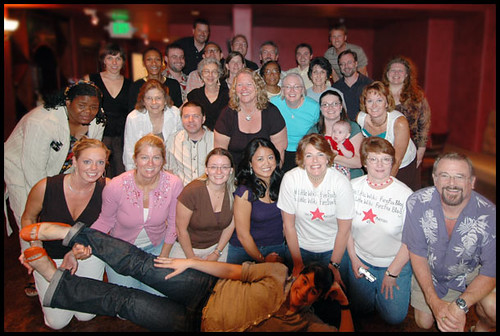
Like many, I’m thinking much about the Web 2.0 buzz and it’s relevance for education. I’ve been a little overwhelmed since my return from NWP’s Tech Matters institute in Chico, both by a desire to become proficient with some of these new tools (i.e., blogs, RSS feeds) and by some of the big ideas behind online “learning networks,” many that challenge the traditional academic hierarchies I'm navigating through. About the former, I’ve been almost paralyzed by the thought that our tech team is scheming a plan to introduce/explore Web2.0 with any interested teachers in our local writing project area. Right now I can hardly make it through a morning without getting lost in the Edublogosphere or trying to explore what some of these online apps can do. There’s just a tremendous amount of stuff going on out there, and I’m dogpaddling. Thankfully, my paralysis was loosened somewhat by a
recent Dave Warlick blog about Web 2.0My goal is not to assure that all of the teachers in my audiences know what a blog is, what RSS is, how to create a wiki, or even publish a podcast. Hell, that’s all going to change anyway. My goal is to convince educators and education stakeholders to understand that these incremental advances in technology have affected our information experience. It has become far more participatory, reader controlled, and it conducts human interactions in ways that were never possible before — and it is having profound affects on many aspects of our culture.
Funny, I sat down to write about D.U.S.T.Y. and Tech Matters and never made it there.
 Like many, I’m thinking much about the Web 2.0 buzz and it’s relevance for education. I’ve been a little overwhelmed since my return from NWP’s Tech Matters institute in Chico, both by a desire to become proficient with some of these new tools (i.e., blogs, RSS feeds) and by some of the big ideas behind online “learning networks,” many that challenge the traditional academic hierarchies I'm navigating through. About the former, I’ve been almost paralyzed by the thought that our tech team is scheming a plan to introduce/explore Web2.0 with any interested teachers in our local writing project area. Right now I can hardly make it through a morning without getting lost in the Edublogosphere or trying to explore what some of these online apps can do. There’s just a tremendous amount of stuff going on out there, and I’m dogpaddling. Thankfully, my paralysis was loosened somewhat by a recent Dave Warlick blog about Web 2.0
Like many, I’m thinking much about the Web 2.0 buzz and it’s relevance for education. I’ve been a little overwhelmed since my return from NWP’s Tech Matters institute in Chico, both by a desire to become proficient with some of these new tools (i.e., blogs, RSS feeds) and by some of the big ideas behind online “learning networks,” many that challenge the traditional academic hierarchies I'm navigating through. About the former, I’ve been almost paralyzed by the thought that our tech team is scheming a plan to introduce/explore Web2.0 with any interested teachers in our local writing project area. Right now I can hardly make it through a morning without getting lost in the Edublogosphere or trying to explore what some of these online apps can do. There’s just a tremendous amount of stuff going on out there, and I’m dogpaddling. Thankfully, my paralysis was loosened somewhat by a recent Dave Warlick blog about Web 2.0
No comments:
Post a Comment